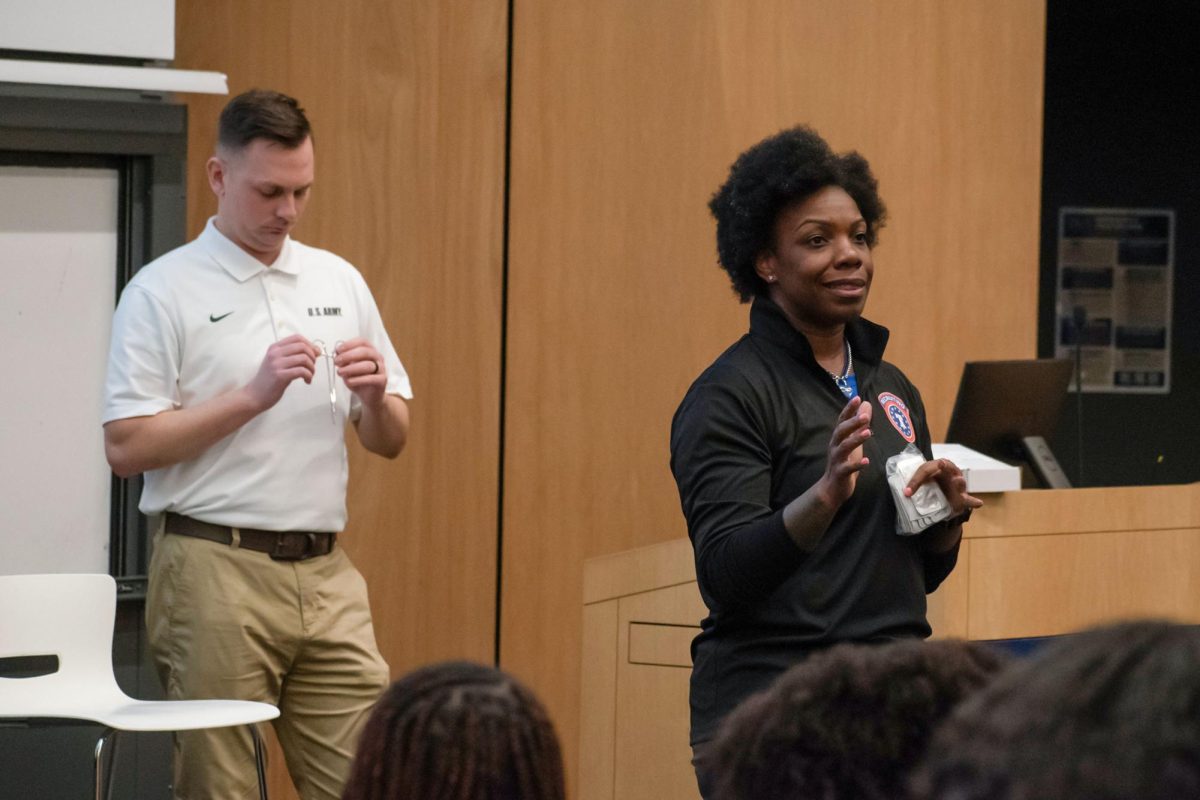Updated: Sept. 9, 2020 at 8:00 p.m.
When junior Justin McCulloch took “World History 1550 to Present” his freshman year, he said professor Jessica Krug mainly focused on African and Caribbean history because professors focus “too much” on Europe.
McCulloch said Krug often criticized White professors who taught Black history. So when McCulloch learned through a Medium post that the professor was in fact a White woman from Kansas City, Missouri who claimed a Black identity for most of her life, he said he was in “complete shock.”
“I had never, ever doubted who she claimed to be,” he said.
McCulloch is one of more than a dozen students and alumni who said Krug “betrayed” their trust by blackfishing – when a person pretends to be Black – and allowing her falsified life experiences to steer class material. They said officials should go further than remove her from her classes and boot her from GW, adding that the University must learn from the situation and increase diversity in academic departments.
Officials have not disclosed how administrators will determine if or when Krug can resume her role, but the history department sent a note to students Friday evening calling on Krug to step down.
Daniel Schwartz, the chair of the history department, did not return multiple requests for comment but wrote to Krug’s students early Friday that the department was seeking to remove her from teaching this fall. Krug has been removed from GW’s course system but is still listed on the department’s website.
The course system now lists Schwartz and Patricia Acerbi, a professorial lecturer of history, as the instructors for Krug’s “History of Latin America I” class. Schwartz is listed as the instructor for her “African History to 1880” class but wrote students Sunday evening that he believes he has found a replacement for the course.
Five students have dropped Krug’s Latin American history course and three have left her African history class since Friday morning, according to GW’s course management system.
“I’ll have more information once it’s official,” he wrote to students in the African history class. “I will be in touch with you whether there will be a class as usual on Wednesday morning or we’ll need to take a break a week in order to get the new instructor up and running.”
Yomaira Figueroa, an associate professor of English and Africana studies at Michigan State University, said she was at a virtual forum Aug. 26 where a professor discussed Hache Carrillo – a former GW professor and writer who died of COVID-19 in April and was found to have falsely claimed to be Afro-Cuban during his career – when she was then approached by a junior scholar who had suspicions about Krug’s identity.
Figueroa said she and three scholars discovered Krug was from Kansas City while researching her after the forum and began reaching out to editors and scholars who had worked with her to find out if anyone knew about her real identity and to trace the various identities she had donned. The group did not contact GW with their findings, she said.
She said she believes Krug outed herself in her Medium post to “control the narrative” of what people would say about her lying about her identity.
“We didn’t want to hurt her in any way, which is why we didn’t come forward on Aug. 27, or 28th, when we had already found out all this information,” Figueroa said. “We just began to ask questions and hopefully think that someone would nudge her in the right direction for her to stop doing this.”
Krug did not return multiple requests for comment.
Students reflect on experiences with Krug
More than 15 former and current students said Krug’s admission was initially “shocking,” but after reading the Medium post, they said they now realize her actions in fabricating her identity were a “performance.”
McCulloch, the junior who took Krug’s world history class, said he emailed Schwartz, the history department chair, saying the incident “proves” the department and GW at-large must hire more faculty of color. Schwartz responded that one of his priorities when running for chair was to diversify the faculty but said GW’s hiring freeze temporarily prevents him from following through, McCulloch said.
“The department wants to make amends,” McCulloch said. “I truly, truly believe that.”
Sophomore Lauryn Renford, who started her “African History to 1880″ class with Krug last week, said Krug would attempt to make a “direct link” between Black students’ experiences and her own, often starting statements with “we.” She said Krug would tell Black students she was “so happy” to have them in the course but did not say the same to non-Black students.
“I realized now that she was creating that relationship that I’m seeing now that she had with a lot of other Black students,” Renford said.
She added that officials should not cancel the course because courses about African history are “limited” at GW.
Scott Ross, a doctoral candidate in the anthropology department, said he took two classes with Krug – including an independent study – and saw her as a “mentor.” He said when meeting her, she appeared as a non-Black person “in my eyes,” but she would sometimes imply or “subtly reference” identifying as Black through her mannerisms.
“When you find out that it’s not real, that it’s a lie, you see how much of a performance it was – how much she was trying to create a particular version of herself,” he said. “It’s also a particular version of what it means to be Black or Afro-Latina, whatever her persona was.”
Ross said GW must disclose whether Krug’s hiring was a result of increasing diversity, as universities often hire to diversify their staff. If her hiring was a result of increasing diversity within GW or the history department, she must be disciplined or officials need to do more to diversify faculty, he said.
He added that students and colleagues Krug “directly lied to or deceived,” especially her Black students and colleagues, should determine how she should be held accountable for her actions.
“In her letter, she talks about accountability, but she doesn’t really take any efforts to actually be accountable to GW, to her students, to her colleagues,” he said.
Officials, faculty members respond
Administrators said Thursday they are investigating Krug’s claim that she lied about her racial identity. University spokesperson Crystal Nosal declined to confirm Thursday when officials were made aware of the post and whether any action would be taken against Krug.
Nosal declined to say Friday how many years Krug has been part of the history department and if students had raised suspicions about Krug falsifying her identity prior to the Medium blog.
Until an individual with tenure retires, their tenure can only be stripped as the result of terminating an instructional program, “extraordinary financial exigency” or “adequate cause,” according to the University’s Faculty Code.
The code defines adequate cause as the “unfitness” to perform duties because of “incompetence,” “lack of scholarly integrity,” “persistent neglect of professional responsibilities” under the code or “gross personal misconduct that destroys academic usefulness.”
“Tenure is reserved for faculty members whose scholarly accomplishments are considered excellent when compared with successful candidates at similar stages of their careers at institutions of higher education or research that are nationally recognized in the particular candidate’s field,” the code states.
Seven history professors declined to comment and 29 professors did not return requests for comment.
Rachel Annex, Zeniya Cooley, Jared Gans, Carly Neilson and Lauren Sforza contributed reporting.
This post has been updated to clarify the following:
This post has been updated to clarify a paraphrase from Ross.








